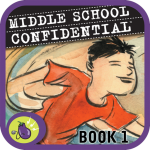|
|
May 16, 2011
by Suzanna Narducci
Suzanna Narducci is an avid tweeter, blogger and co-founder of TweenParent.com. She’s always been fascinated by the evolution of an idea into a successful business. After an interesting but intense run in the fashion business, Suzanna decided to switch gears and become a mother. As Suzanna’s children grew, she realized that a reliable and consolidated resource for parents of pre-teens was missing in the marketplace. Suzanna shared her idea with her friend and now business partner, Judy King-Murray, and TweenParent.com was born. We’re so glad that it was!
 Give it back you little @#$%! At some point in their lives, most kids experience bullying of some type – whether it is in school, in the neighborhood, online or another social situation. The truth is most kids will not only be bullied, but will also harass other kids. For parents, the challenge is how to help their children develop the social skills they need to positively assert themselves in negative situations.
Fortunately, what children learn at home is transferable to their outside interactions. In a study published by the British Journal of Developmental Psychology, Dr. Ersilia Menesini and her colleagues at the Universita’ degi Studi di Firenze found that there was a direct correlation between sibling bullying and victimization and bullying and victimization at school. In short, the roles kids play out at home are likely to be reenacted with peers. According to the study, the children in families with high levels of conflict and low levels of empathy were at greatest risk. In light of these results, Dr. Menesini recommends that parents actively mediate when their kids start arguing.
Of course, it is normal for brothers and sisters to argue. However, parents can help their children learn to move forward in conflicts in a way that is not hurtful by actively teaching them skills to gain empathy while positively asserting their feelings. Here are some suggestions to help parents teach their tweens how to resolve arguments in a positive way.
- Listen and Reflect. Expect your kids to listen to each other’s point of view. Teach them to repeat back what they’ve heard from each other and explain why they think that their siblings feel the way that they do. They don’t have to agree, just understand.
- Avoid the Blame Game. Talk about how each person contributed to the situation, rather than placing blame. Start sentences with “I felt” rather than “you did,” to dissipate defensiveness.
- House Rules. Name calling, belittling, undermining and teasing by anyone in the family is not only hurtful, but also damaging to a child’s self-esteem. Kids begin to believe that negative comments that are consistently repeated about them – even in jest or teasing — are true.
- Keep Perspective. Developing a healthy relationship between siblings takes time. The end goal is to help your kids learn both how to constructively express their feelings and develop a better understanding of their siblings’ feelings. This won’t happen overnight, but by feeling that their needs are also being considered to resolve conflict, they will gain confidence and, hopefully, experience less aggression.
If all goes well, your kids will not only develop the skills they need to help them in their social lives at home and beyond, but will also recognize that this type of interaction is healthy and normal will help them have emotionally fulfilling and trusting relationships as adults.

May 12, 2011
 Didn't sign up for this! It’s spring. Nature’s juices are flowing all around us… and inside us too. If you’re single and wish you weren’t and all that flowing juice isn’t enough to remind you how much you want a bf/gf, let’s add Prom to the mix!
If your top priority is getting a bf/gf , it may seem like your school is packed with lovey-dovey couples. The sight or the sound of them (talking endlessly about each other) may be enough to make you wanna scream, barf or cry.
If you have a bf/gf (w/the added status boost that comes with it) you probably don’t want to lose them. That’s why t(w)eens in relationships often try to ignore the bad stuff and convince themselves things are cool even when that little voice inside screams “I’m not happy!” Your Inner Voice knows you better than Mom. Ignoring its messages rarely helps a situation.
I just got this email from a girl who doesn’t seem to trust her Inner Voice, which is why she turned to me for a second opinion. What do you think of the opinion I gave her?
Hey Annie,
Me and this boy are together but he doesn’t call me and that makes me cry. I need help. What should I do?
Confused
______________________
Hi Confused,
It sounds like you and your bf have different ideas about what it means to be “together.” You’re unhappy because he’s not paying as much attention as you want. Have you talked to him about it? You might say something like, “I want you to call me every day.” (Or however often you think he should be calling.) Of course, telling him straight-up what you want is no guarantee that he’ll change his behavior.
The real question is: Does this guy want to be with you as much as you want to be with him? You deserve that level of interest from a boyfriend… but you can’t force someone to care about you. If he doesn’t want you, dry your tears, move on and find someone who treats you better. If you keep putting up with less than what you want, you’re sending him a message that says, “I don’t deserve any better than this from a boyfriend, so keep on ignoring me and I’ll keep putting up with it.”
If that’s not the message you want him to get, then tell him what you really mean.
I hope this helps.
In friendship,
Annie

May 7, 2011
 That's my mom My mom, Martha Scolnick Larris, has been gone for 17 years. I’d be lying if I said we had an easy relationship. It was often contentious and frustrating and hurtful. (As much for her, I’m sure, as it was for me.) But there was also a lot of good stuff.
Memories of Martha pop in throughout the year… her impressive vocabulary and quick wit, her instant rapport with every young child she encountered, her self-reliance and her sense of fairness. But it’s springtime when she comes to me most often. As I admire my neighborhood in bloom, pick aphids off my roses… I think of her. The fact that I have a garden which gives me so much pleasure is a direct result of being my mom’s daughter. Let me tell you, that woman knew her flowers and because of her, so do I.
Maybe it seems a small thing to know a freesia from a forsythia, a hydrangea from a hyacinth. And who really cares if those irises I got from my neighbor seem bluer this year than ever before? I care. I can’t help it. This special awareness of plants provides me… no compels me to pay attention and celebrate color, light, form and fragrance. If I saw them all as “just flowers” I’d be missing most of the show. Seeing at that level ain’t small potatoes, so thank you, Mom.
 My mom grew irises and now so do I. I’ve been thinking about parental legacies so I asked friends and family what “life lessons” they had learned from their mom. Here’s a sampling of what people said:
- Don’t take too long to shuffle the cards. It drives people crazy.
- Don’t be so dramatic.
- Don’t be like me.
- Don’t waste money, water or electricity.
- It can’t hurt to ask.
- Be kind to children.
- Always put your best foot forward whatever you do.
- Go for whatever you want in life.
- Creativity is a good thing.
- Do for each of your children what they need.
- When you go to dinner at someone’s house, bring some cake.
- When you get a gift, write a nice Thank You note. Do it now!
- Taste it, you might like it.
- Enjoy life today, you could be hit by a bus tomorrow.
- Honesty, loving kindness, selflessness, humility, femininity, grace.
- Aging is in the mind of the beholder.
- A women needs to be educated, to have a career and a profession. You never know what is going to happen to you, you always need to be able to support yourself and to stand on your own two feet.
- Live in and enjoy the moment. That became an internal positive tape – that I can do anything and that I’m beautiful.
- Due to my mom’s inability to handle her own life, I learned to do many adult things and my opinion was heavily relied upon even as a small child – of course, that greatly prepared me for taking on adult responsibilities and taking for granted that I could do those things.
- My mom taught me about unconditional love and acceptance. She was very tolerant/accepting and allowed me to experience things for myself without judgment. She also was accepting and helpful to many of my friends during my adolescence – something I tried hard to do as well for my kids and their friends!
- Mom had two distinct personalities, one usually light and happy, and one dark and unhappy, so I had to make adjustments in the way I thought about her. I began to see the light and dark sides in others, also, but with others, the line of separation was not as distinct. As I grew older, I learned how to fight the dark influences from others and enjoy the lighter sides that people offered.
- How to listen without projection or attachment and lovingly to others, especially those you love. Trust that they will find the right way for their unique path.
- At my mother’s funeral an actor who’d worked with her on stage in her later years (she started out on Broadway before she met my father) told of a local parade where the cast was asked to participate. This actor was resistant to doing it. My mother chided him “You’ve got to love it!” He said it shifted his attitude completely and that he’d learned much from working with her as a professional actress. This is a side of my mother I never knew. I now throw myself into projects with more abandon remembering her words.
My glasses aren’t so rose-tinted that I see all moms as a positive influence on their kids all the time. I know that people, including our own parents, come into our lives for a reason. Even in a less than wonderful childhood there are positive lessons we can take from our relationship with our mothers.
As you take a moment to look back, see what you can find, from all that you learned from Mom, that’s been helpful to you. Acknowledge that contribution in whatever way makes sense. Now think about the long and short-term choices you make in relation to your own children… that’s a legacy you’re handing to them. Hopeful it’s a life-affirming one.

May 6, 2011
 "Be Confident" on sale for $.99 (May 6, 2011 only) Fridays are inherently cool. App Fridays are especially welcome because that’s when Moms With Apps* features their weekly link exchange of family-friendly apps. And guess who’s featured today? That would be me and David (aka Electric Eggplant). Which is why, for today, Friday, May 6th 2011, our Middle School Confidential app (aka Be Confident) is on sale for 99 cents. Got a 4th-8th grader? Got access to an iPad. For $.99 you can give that kid you love something (s)he wants more than anything… the gift of confidence to be who they really are.
 MWA: seeking to promote quality apps for kids and families *Never heard of Moms With Apps!? Let me tell you, for newbie app developers like me and David, this wonderfully supportive consortium that’s committed to quality kid and family content, has been the difference between stumbling and bumbling on all-fours vs. having a lighted path to walk on. We’re grateful for their friendship and ongoing support, so here’s a plug for them. They’ve launched their own app the Moms With Apps App Catalogue (of apps, of course!) Check ’em out.
Update (May 7th, 2011): Our app has now returned to its normal price of $3.99. Download our Be Confident iPad app.
 — Older Posts »
| |
















